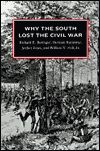


Book Review
WHY THE SOUTH LOST THE CIVIL WAR by Richard E. Beringer, Herman Hattaway, Archer Jones, and William N. Still, Jr. The University of Georgia Press, 1986, 442 pages (appendices, notes, bibliography and index) Reviewed by Joe Childress Why did the South lose the Civil War? At the beginning of the Civil War, conventional military theory held that a country as large as the Southern Confederacy could not be conquered by military invasion. Even as late as December 1864, only one Confederate state (Tennessee) and a small portion of the remaining Confederate territory was substantially under the control of the Union army. Almost all important cities and industrial centers remained in Southern hands. No Southern army with competent leadership had been captured, or annihilated in the field; the military power of the Confederate army was still formidable. In this study the authors contend that the Confederacy was not defeated by overwhelming force. The Confederate States Army had the men and materiel needed to continue the struggle indefinitely. Referring throughout to the premier military theorists of the time, Clausewicz and Jomini, and basing their conclusions on these contemporary theories, the authors analyze carefully the military prospects of the Confederacy at the beginning of the conflict and throughout the war. They make a convincing case that the outcome of the Civil War was far from preordained; given the proper strategy, the Confederacy had a very good chance of winning, even as late as 1864. The Union successfully used its superior military power to destroy the Confederate will, both civilian and military, to continue the war. The Confederate defeat resulted from a lack of morale, among both the military and civilian populations due to a variety of causes, including lack of a clear objective, insufficient nationalism, a strategy that pinned Southern hopes on winning battles, and the loss of the belief that God favored their side. In the course of laying out their own explanation for Southern defeat, the authors also argue against other conventional theories, including: the Confederacy died of "states rights", the Confederacy was overwhelmed by Northern might; and theory that the South's Celtic heritage brought on defeat. "Why isn't this book more widely read, or, at least, more widely known?" Quite frankly, this is a difficult book to read. It is much slower reading than the standard Civil War biography or campaign study. This is serious history; it is meticulously researched and the authors back up their conclusions with dense, fact-laden, (and sometimes redundant) arguments. However, this reviewer believes that every serious Civil War student should be familiar with these ideas, and this book deserves a place in the basic Civil War library. Availability: Currently available from Barnes & Noble for $18.36 soft cover and $34.95 in hardbound. Used copies are available from on line book dealers. Hardbound copies are available from $11.00 to $65 for a signed first edition and softbound copies are available at prices ranging from $8.00.
RCWRT Members, if you would like to share a CW book report on our web site, please mail it to: Joe Childress 12706 Fox Meadow Drive Richmond, VA 23233 OR E-mail either as text or a .doc attachment to: cowardin@juno.com
Return to Book Report Index
Return to main page

©R.C.W.R.T. 2000